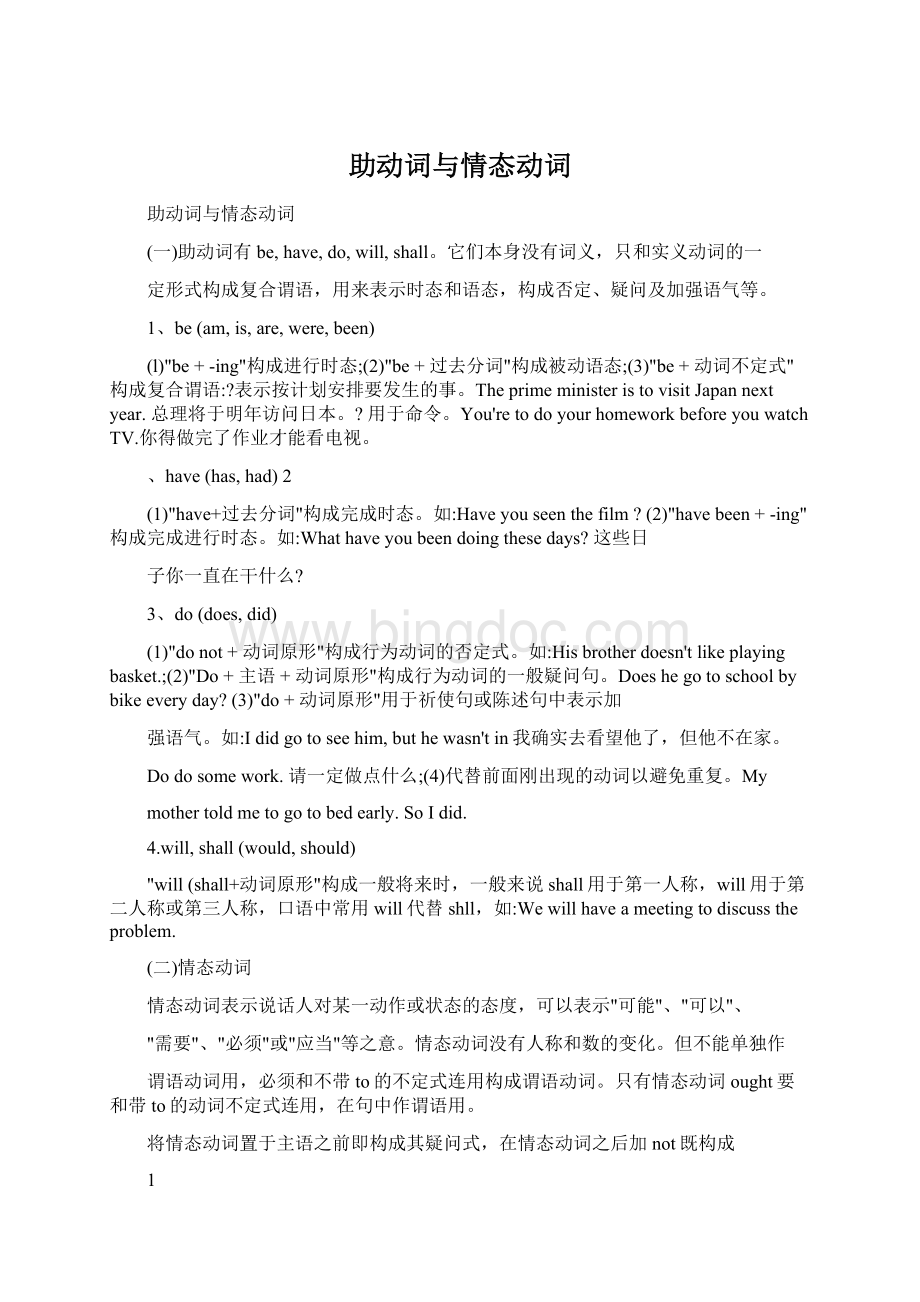助动词与情态动词.docx
《助动词与情态动词.docx》由会员分享,可在线阅读,更多相关《助动词与情态动词.docx(8页珍藏版)》请在冰点文库上搜索。

助动词与情态动词
助动词与情态动词
(一)助动词有be,have,do,will,shall。
它们本身没有词义,只和实义动词的一
定形式构成复合谓语,用来表示时态和语态,构成否定、疑问及加强语气等。
1、be(am,is,are,were,been)
(l)"be+-ing"构成进行时态;
(2)"be+过去分词"构成被动语态;(3)"be+动词不定式"构成复合谓语:
?
表示按计划安排要发生的事。
TheprimeministeristovisitJapannextyear.总理将于明年访问日本。
?
用于命令。
You'retodoyourhomeworkbeforeyouwatchTV.你得做完了作业才能看电视。
、have(has,had)2
(1)"have+过去分词"构成完成时态。
如:
Haveyouseenthefilm?
(2)"havebeen+-ing"构成完成进行时态。
如:
Whathaveyoubeendoingthesedays?
这些日
子你一直在干什么?
3、do(does,did)
(1)"donot+动词原形"构成行为动词的否定式。
如:
Hisbrotherdoesn'tlikeplayingbasket.;
(2)"Do+主语+动词原形"构成行为动词的一般疑问句。
Doeshegotoschoolbybikeeveryday?
(3)"do+动词原形"用于祈使句或陈述句中表示加
强语气。
如:
Ididgotoseehim,buthewasn'tin我确实去看望他了,但他不在家。
Dodosomework.请一定做点什么;(4)代替前面刚出现的动词以避免重复。
My
mothertoldmetogotobedearly.SoIdid.
4.will,shall(would,should)
"will(shall+动词原形"构成一般将来时,一般来说shall用于第一人称,will用于第二人称或第三人称,口语中常用will代替shll,如:
Wewillhaveameetingtodiscusstheproblem.
(二)情态动词
情态动词表示说话人对某一动作或状态的态度,可以表示"可能"、"可以"、
"需要"、"必须"或"应当"等之意。
情态动词没有人称和数的变化。
但不能单独作
谓语动词用,必须和不带to的不定式连用构成谓语动词。
只有情态动词ought要和带to的动词不定式连用,在句中作谓语用。
将情态动词置于主语之前即构成其疑问式,在情态动词之后加not既构成
1
其否定式。
现将各情态动词的基本用法分述如下:
1、can和could(could为can的过去式)的基本用法
(1)表示能力,如:
HecanspeakEnglishbetterthanyou.
(2)在疑问句和否定
句中表示"怀疑"、"猜测"或"可能性",如:
CanthisgreenbikebeLiuDong's?
(3)表示"许可"时can可以和may换用,如:
Youcan(may)gohomenow.(4)如果要
表示语气婉转,可用could代替can,这时could不再是can的过去式,如:
Could
youcomeagaintomorrow?
(5)can和beableto都可表示能力,两者在意思上没有
什么区别。
但是can只能有现在式和过去式,而beableto则有更多的形式,如:
Hewillbeabletodotheworkbetter.
2、may和might(might为may的过去式)的基本用法
(1)表示允许或征询对方许可,有"可以"之意,如:
Youmayusemydictionary.在回答对方说"可以做某事"或"不可以做某事"时,一般多不用may或maynot,
以避免语气生硬或不容气。
而用比较婉转的说法进行回答。
如:
----MayIusethisdictionary?
----Yes,please.或----Certainly.在请求对方许可时,如果MightI…?
就比用MayI…?
语气更婉转些,如:
MayIhavealookatyournewcomputer?
但
是表示"阻止"或"禁止"对方做某事时,要用mustnot代替maynot,如:
----Mayweswiminthislake?
----No,youmustn't.It'stoodangerous.
(2)may或might都可以表
示可能性,表示"或许"、"可能"之意,如果用might表示可能性,则语气更加不
肯定,如:
Theymay(might)beinthelibrarynow.
3、must的基本用法
(1)must表示"必须"、"应该"之意,其否定式mustnot,缩写形式为mustn't,
表示"不应该","不准"、"不许可"或"禁止"之意,如:
Wemuststudyhardandmakeprogresseveryday.Youmustn'ttouchthefire.
(2)对以must提出的疑问句,如作否
定回答时,要用needn't或用don't(doesn't)haveto(不必)来回答,而不用mustn't,
因为mustn't表示的是"禁止"或"不许可"之意,如:
----Mustwefinishtheworktomorrow?
----No,youneedn't(don'thaveto),butyoumustfinishitinthreedays.(3)
在肯定句中must可以表示推测,表示"一定"或"必定"之意,如:
----Whosenewbikecanitbe?
----ItmustbeLiuDong's.Iknowhisfatherhasjustboughthimanewone.
4、can,could,may,must后接完成式的用法
2
(1)can,could后接完成式的用法:
?
在否定句或疑问句中表示对过去发生过
的事情的"怀疑"或"不肯定"的态度,Couldhehavesaidso?
?
在肯定句中,可以
表示过去可能做到而实际并没做到的事情,有"劝告"或"责备"的语气。
如:
----Whendidyouanswerherletter?
----Onlyyesterday.----It'stoolate.Youcouldhave
answereditearlier,Iamsure.
(2)may,might后接完成式的用法?
表示对过去某事
的推测,认为某一件事情在过去可能发生了。
如果使用might,语气就比较婉转
或更加不肯定,如:
MarymighthavelearnedsomeChinesebefore.?
可以表示过
去本来可以做到而实际没有做到的事情,有"劝告"或"责备"的语气,如:
Youdidn'tdotheworkwellthatday.Youmighthavedoneitbetter.(3)must后接完成式
的用法:
表示对过去某事的推测,认为某事在过去一定做到了,如:
LiuDongisn'tintheclassroom.Hemusthavegonetothelibrary.
5、haveto的基本用法:
haveto和must的意义相近,只是must侧重表示
说话人的主观看法,而haveto则表示客观需要,如:
Imuststudyhard.Ihadtogive
itupbecauseofillness.
6、oughtto的基本用法
(l)表示根据某种义务或必要"应当"做某事,语气比should强,例如:
Everyoneoughttoobeythetrafficregulations.
(2)表示推测,注意与must表示推测时的区别:
Hemustbehomebynow.(断定他已到家),Heoughttobehomebynow.(不十分肯
定),Thisiswheretheoilmustbe.(比较直率),Thisiswheretheoiloughttobe.(比
较含蓄);(3)"ought+have+过去分词"表示过去应做某事而实际未做。
例如:
Yououghttohavehelpedhim.(butyoudidn't)这时,ought与should可以互相换
用。
注意,在美国英语中oughtto用于否定和疑问句时to可以省略。
例如:
Oughtyousmokesomuch?
Yououghtn'tsmokesomuch.
7、dare的基本用法
(l)dare(dared为其过去式)作情态动词用时,主要用于否定句,疑问句和条
件从句中,如:
Daredhebreadthetrafficregulationsagain?
(2)在现代英语中dare常用作行为动词,其变化与一般行为动词相同,如:
Shedarestostayathomealoneatnight.
8、need的基本用法
3
(1)need作情态动词用时,主要用于否定句和疑问句中,如:
Heneedn'tworry
aboutusnow.
(2)need也可作为行为动词用,可用于肯定句,否定句和疑问句中,
其后可接名词、代词、动名词或带to的动词不定式为其宾语。
如:
Youneedto
practisereadingaloudeveryday.(3)needn't后接完成式可以表示过去做了一件本来
不必要做的事情,如:
----Didyouanswertheletteryesterday?
----Yes,Idid.----But
youneedn'thaveansweredit.
9、shall的基本用法
(1)shall用作情态动词时,用于第二、三人称,表示说活人的意愿,可表示"
命令"、"警告"、"强制"、"威胁"或"允诺"等意,如:
Heshallgofirst,whetherhewantstoornot.
(2)在疑问句中,shall用于第一、三人称,表示说话人的征询对方意见
或请求指示,如:
ShallIopenthedoor?
10、should的基本用法
(1)should作为情态动词可以表示"建议"或"劝告",有"应该"之意,如:
You
shouldlearnfromeachother.
(2)should后接完成式表示过去没有做到本来应该做
的事情,或是做了本来不应该做的事情。
如:
Youshouldhavegivehimmorehelp.
11、will的基本用法
(1)用于各人称,可以表示"意志"或"决心",如:
Ihavetoldhimagainandagaintostopsmoking,buthewillnotlisten.
(2)在疑问句中用于第二人称,表示说话人向
对方提出请求或询问对方的意愿,如:
WillyoupleasetellmehowtogettotheCapitalGymnasium?
(3)will可以表示一种习惯性的动作,有"总是"或"会要"之意,
如:
Everymorninghewillhaveawalkalongthisriver.
12、would的基本用法
(1)would作为will的过去式,可用于各人称,表示过去时间的"意志"或"决
心",如:
Hepromisedhewouldneversmokeagain.
(2)在疑问句中,用于第二人称,
表示说话人向对方提出请求或许问对方的意愿时,比用will的气更加婉转,如:
Wouldyoulikesomemorecoffee?
(3)在日常生活中,学用"Iwouldliketo…"表示"
我想要"或"我愿意"之意,以使语气婉转,如:
IwouldliketodoEx.2first.(4)would可以表示过去的习惯动作,比usedto正式,并没有"现已无此习惯"的含义。
如:
LastyearourEnglishteacherwouldsometimestellusstoriesinEnglishafterclass./
4
Duringthevacationhewouldvisitmeeveryweek.(5)表料想或猜想,如:
Itwouldbe
abouttenwhenhelefthome./Whatwouldshebedoingthere?
/Ithoughthewouldhavetoldyouaboutit.
13、usedto,hadbetter,wouldrather的用法
(1)usedto表示过去的习惯动作或状态,现在已不存在,在间接引语中,其
形式可不变,例如:
Hetoldusheusedtoplayfootballwhenhewasyoung.在疑问
句、否定句、否定疑问句或强调句中,可有两种形式。
疑问句:
Didyouuseto/Used
youtogotothesameschoolasyourbrother?
否定句:
Iusedn'tto/didn'tusetogo
there.(usedn't也可写作usen't);否定疑问句:
Usen'tyouto/Didn'tyouusetobe
interestedinthetheatre?
强调句:
Icertainlyusedto/didusetosmoke,butitwasalongtimeago.;其反意疑问句或简略回答中,也有两种形式:
Sheusedtobeveryfat.
didn'tshe?
/use(d)n'tshe?
Didyouusetoplaychess?
Yes,Idid./Usedyoutogetupearlyinthemorning?
Yes,Idid./usedto.
(2)hadbetter意为"最好",后接不带to的
不定式,例如:
----Wehadbettergonow.----Yes,wehad(we'dbetter/wehadbetter)./Hadn'twebetterstopnow?
(Hadwebetternotstopnow?
)/IthinkI'dbetterbegoing.(用于进行时态,表"最好立即")/Youhadbetterhavedonethat(用于完成
时态,表未完成动作)注:
hadbetter用于同辈或小辈,对长辈不可用。
(3)would
rather意为"宁愿",表选择,后接不带to的不定式,例如:
I'drathernotsayanything./
Wouldyouratherworkonafarm?
/----Wouldn'tyouratherstayhere?
----No,Iwouldnot.I'drathergothere.由于wouldrather表选择,因而后可接than,例如:
Iwouldratherworkonafarmthaninafactory./IwouldratherwatchTVthangotoseethefilm/Iwouldratherloseadozencherrytreesthanthatyoushouldtellmeonelie./I'dratheryoudidn'ttalkaboutthistoanyone.(句中的'drather不是情态动词,
would在此是表愿望的实义动词)
练习、助动词与情态动词
1.Ifthey_________todothiswork,hemightdoitsomeotherway.
A.wereB.shouldC.willD.can
2.Iwastoldyesterdaythatthecompany_________metoRomenextweekforabusinessconference.
A.shouldhavesentB.weregoingtosendC.shouldbesendingD.shouldsend
5
3.Let'stakeawalk,________?
A.willweB.don'tweC.doweD.shallwe
4.Hewasagoodswimmersohe_________swimtotheriverbankwhentheboatsank.
A.couldB.mightC.shouldD.wasableto
5.Iwenttothedoctor'syesterday,Ihadtowaitforhalfanhourbeforehe________seeme.
A.canB.mayC.mightD.could
6.----_________thisbookbeyours?
----No,it________notbemine.It________behis.
A.Can,must,mayB.May,might,mustC.Can,may,mustD.Must,can,may
7."Wedidn'tseehimatthelectureyesterday.""He_________it."
A.mustn'tattendB.can'thaveattendedC.wouldhavenotattendedD.neededhaveattended
8.They_________theplane,orperhapstheyhavebeenpreventedfromcomingforsomereason.
A.canhavemissedB.mayhavemissedC.canhavelostD.mayhavelost
9.Sincethegroundiswhite,it_________lastnight.
A.hadsnowedB.musthavesnowedC.mustbesnowingD.musthavebeensnowing
10.Youmustbefifty,________?
A.mustn'tyouB.needn'tyouC.aren'tyouD.mnyn'tyou
11.Youmusthaveseenhimoffyesterday,_________?
A.haven'tyouB.didn'tyouC.mustn'tyouD.needn'tyou
12.----Thatmustbeamistake.----No.it_________be.
A.can'tB.isn'tabletoC.canD.wasableto
13.Hehadknownthematterbeforeyoutoldhim,soyou_________havetoldittohim.
A.mustn'tB.can'tC.needn'tD.shouldn't
14.How________so?
A.dareyoutosayB.dareyousayC.doyoudaresayD.daretosay
6
15.Youaretheirteacher.You_________careofthem.
A.shouldtotakeB.mighttotakeC.oughttotakeD.needtotake
16.Sheisstudyingmedicalsciencenowbutshe_________alawyer.
A.usedtobeB.wouldbeC.wereD.hadbeen
17.IfyouwereinanEnglish-speakingcountry,you,too,_________Englisheveryday.
A.willbeusedtospeakB.willbeusedtospeaking
C.mustbeusedtospeakD.wouldbeusedtospeaking
18.Ididnotcalltomakemyairlinereservation(预订)butI_________.
A.shouldhaveB,mayhaveC.musthaveD.shallhave
19.Asagirl,she_________getupatsixeveryday.
A.wouldB.willC.mightD.should
20.Don'tyourememberthatwe_________tothecinematonight?
A.wouldgoB.goC.aregoingD.willbegone
21.----ShallItellJohnaboutit?
----No,you_________.I'vetoldhimalready.
A.needn'tB.wouldn'tC.mustn'tD.shouldn't
22."Wouldyoumindif